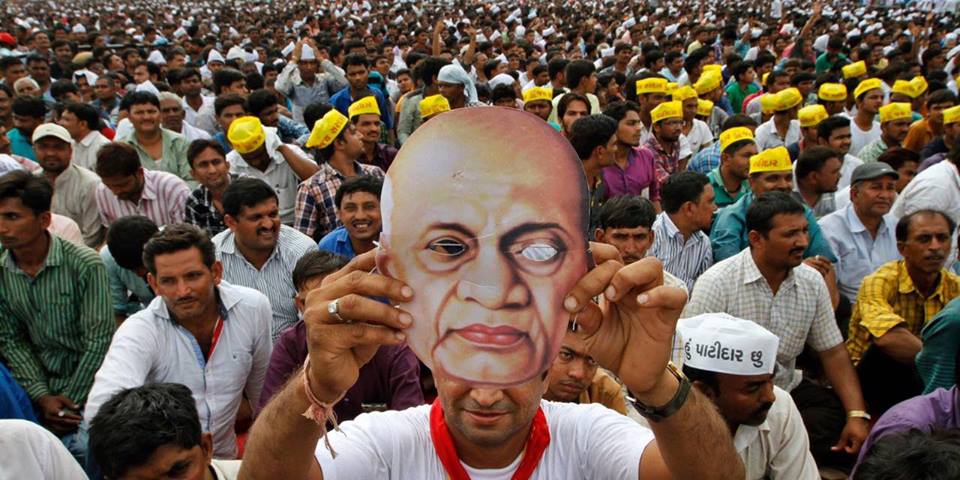Govt Caught in Caste Quagmire in Gujarat: Lalji Picks Up Hardik Patel Mantle

AHMEDABAD: Violence works seems to be the message being sent out by the Modi government as it tackles the demand for reservations by influential communities such as the Jats in Haryana and now the Patidars’ in Gujarat. After a day of violence, the state government has invited the Patel community leaders for talks on their demand for reservations in the wake of a call for a state wide shut down.
Mehsana, the home town of Prime Minister Narendra Modi, was at the centre of the stir in this second phase, with curfew being imposed by a panicking state government. Parts of Gujarat resembled Kashmir, with curfew, a police crackdown leaving many injured, suspension of internet mobile services, and a statewide alert.
This time the protest was led by Lalji Patel of the Sardar Patel group, who was badly beaten by the police and hospitalised. Sources in the state said that this has led to widespread disaffection amongst the community, with a key demand also being the release of Hardik Patel who has been in jail since last October on charges of sedition. He has not been able to secure bail.
The government’s promise to meet the reservation demand of the powerful Jat community in Haryana, sources said, brought Lalji Patel under pressure from the Patels to pick up the mantle from Hardik Patel. It might be recalled that the Patels, about 17% of the Gujarat population, have been very close to the BJP and seen traditionally as its vote bank. Lalji Patel himself was a Yuva Morcha president in Mehsana, and Hardik Patel worked with him. The two fell out when the latter insisted on agitating for reservations, while the elder Patel favoured a more mediatory approach.
The second phase of this agitation in Gujarat is crucial as it has brought Lalji Patel to the fore, and the attack on him has united the Patidar groups according to sources on the ground. The stir that paralysed the state government on Sunday was also supported by Hardik Patel’s outfit Patidar Anamat Andolan Samiti, indicating a consolidation of the two main organisations and the community as a whole. Earlier when Hardik Patel had led the protests Lalji Patel had been critical, saying that he had allowed the youth to handle the social internet sites for the Sardar Patel Group but that he had run away with the idea in a manner that was not anticipated.
The Patel community stir has already hit the BJP hard in Mehsana, from where PM Modi and Gujarat CM Anandiben Patel come from. The Congress won almost all the seats in the local elections last November, with the BJP reduced from 20 seats to just a couple. The Congress, however, is keeping a distance from the Patidar agitation for the moment as it is not keen to upset its traditional Thakor community support at this point.
Interestingly, the Thakor community held a huge rally in January this year in what was seen as a counter to the Hardik Patel protest and demand for reservations. Sources said that the state government had extended full support to this rally, a point noted and criticised by the Patidars as signs of a discriminatory approach. OBC leader Alpesh Thakor, urged OBC, SC and ST communities to unite ahead of the 2017 Assembly elections and asserted that the next Gujarat Chief Minister would be decided by them. Thakors alone constitute over 22 per cent of Gujarats population, the sources said.The rally was held at the same venue where Hardik Patel had addressed a huge meeting in August last year. It was seen by all as a show of strength with Alpesh Thakor urging the meeting to start preparing for the 2017 elections in the state, and to thereby ensure that the Chief Minister of their choice was elected.
The government seems to be caught between the rock and a hard place. The caste equations in Gujarat have come to the fore with the restive electorate now demanding the realisation of campaign promises, and a slice of the power cake. In a polity where divide and rule remains the slogan, the governments---as in Haryana and Gujarat---are finding it difficult to manage the divide. As a young Patidar student said when asked why the Gujarat government had decided to crack down on its own vote bank, “I don’t know seriously. We cannot understand it. Perhaps it is the arrogance of power.”



